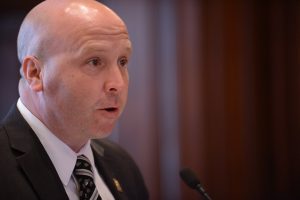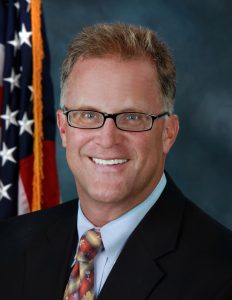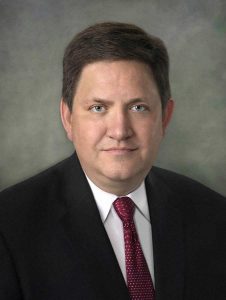Local consolidation law gets sluggish county participation
By Jean Lotus Staff Reporter — December 19, 2016
Property tax bills across Illinois show the overlapping local taxing districts that each take a bite of the taxpayer’s dollar. Now state legislators and Gov. Bruce Rauner are taking a look at consolidating almost 7,000 local agencies and trying to get them to share services and streamline expenses.
It’s an issue that Democrats and Republicans can agree on, said State Sen. Tom Cullerton (D-Villa Park). Cullerton worked with State Rep. David McSweeney (R-Barrington Hills) to pass PA 99-0634, which asks 102 county boards to take a fresh look at all of the mosquito abatement, sanitary and fire-protection districts in their county and suggest ways to consolidate services.
The county reports are due Jan. 1, 2017, but so far, 101 of those counties have not responded, Cullerton said. The only county to respond is DuPage, where Board Chair Dan Cronin (R-Elmhurst) has been on a consolidation mission since 2011.
“Imagine if you could wave a magic wand and wipe the slate clean and it was your job to redesign local government,” Cronin said at an April 20 event for the Better Government Association in Oak Brook. “Would you set it up this way? I think the answer is, of course you wouldn’t.”
After financial scandals in the DuPage Housing Authority and DuPage Water Commission, the DuPage County Board passed the DuPage ACT Initiative (Accountability, Consolidation and Transparency) in 2011. The board commissioned an audit of all of the independent taxing districts whose board members are appointed by Cronin. The audit found local board members with taxpayer-backed credit cards and cell phones as well as financial shortcutting and sloppiness.
“They’re overlapping, inefficient, independent silos with people focused on one mission when they could work together,” Cronin said in April, mentioning a local employee who was the fourth generation to work at a local water district. “I thought, you’re kidding me. What is this, a family business, operating under the radar?”
So far, the DuPage ACT Initiative has eliminated the Fairview Fire Protection District, the DuPage Fair and Exposition Authority, the Timberlake Estates Sanitary District and the Century Hill Street Lighting District. The consolidation has resulted in $100 million in savings. The board also streamlined the Fairview Fire Protection District, one of six “paper districts” in the county that utilized the fire protection services of a neighboring district.
Maybe because Cullerton represents DuPage, or maybe because he’s seen local government from the inside as a former mayor of Villa Park — or maybe because he’s a relative of State Sen. President John Cullerton — the move to consolidate local government has finally become a law.
“When I got to Springfield and talked about consolidation, my colleagues said, ‘That’s a great idea — and it was a great idea two years ago, and four years ago and 10 years ago when it was first proposed.’”
The time seems right, at least in Springfield, for this movement to reform local government. But the deafening silence from county executives perhaps shows how reluctant they are to participate.
“That’s what’s going to be a big sticking point. Nobody wants to give up what they have,” Cullerton said.
Consolidation doesn’t necessarily mean firing anyone, he insisted.
“We’re taking a look at streamlining, consolidating, not providing overlapping services. We’re asking these agencies, why don’t you work with each other, to see if you can help each other find a way to combine,” Cullerton said.
“If we can utilize the DuPage model, in three or four years we can drop five-to-10 units of government per county,” Cullerton speculated. “It can make a real dent in the number of taxing bodies.”
Not all counties have a population of 1 million people, like DuPage, or 4.1 million like Cook County, Cullerton acknowledges, so dissolving agencies might be more drastic in smaller counties.
Not all local government boards are controlled by the county executives, either. Cronin appoints members to 39 different boards, according to the Daily Herald. But many local boards in Illinois are appointed by township committeemen. Cronin serves as a York Township Republican Committeeman.
Nonetheless, there are efficiencies to be squeezed out of local government, legislators believe.
“The best way to insure we have lower property taxes is to promote consolidation,” said State Rep. David McSweeney. “The voters understand that we have unnecessary levels of government. We have to push [counties] hard to comply with this law so we can eventually let the voters decide whether to maintain these [units of government].”
McSweeney is also working on legislation that changes the way taxing bodies are dissolved. Currently, the process often involves a referendum, followed by a special law, specific to the dissolution, passed in the General Assembly.
“I’m trying to change the mechanism to make it easier to consolidate,” McSweeney said. “The current system doesn’t work. It’s too difficult.”
Cullerton said he expected push-back from county boards. “Right now we have a soft hammer, which is a letter going out from me, then a follow-up from the governor’s office.”
Cullerton points out, the Governor has already started consolidating other agencies, such as police and fire dispatch services for small towns.
“Breaking old habits, breaking old cycles is never easy,” Cullerton said. “But
I have to be optimistic that everybody’s going to want to do it because they want to get better. We’re all going for the goal, getting our services better for the taxpayer.
“We want voter trust,” he added. “Consolidation isn’t the answer to the state budget problems, but it helps build voter trust in their local government and
— Local consolidation law gets sluggish county participation —






